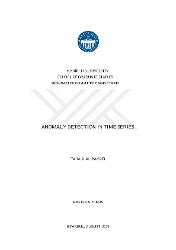| dc.contributor.advisor | Ö?renci, Arif Selçuk | en_US |
| dc.contributor.author | Al-Bayati, Taha A. | |
| dc.date.accessioned | 2020-02-20T14:29:36Z | |
| dc.date.available | 2020-02-20T14:29:36Z | |
| dc.date.issued | 2019 | |
| dc.identifier.uri | https://hdl.handle.net/20.500.12469/2784 | |
| dc.description.abstract | The concept of "Internet of Things" is based on connecting any physical object through the internet. This will facilitate our daily lives by dedicating technology in our will. In such a world, the number other interconnected devices is enormous, hence, the need for high performance processing in real-time is huge. This research shines light on the importance of the event processing and machine learning in the time series. A multiple of machine learning algorithms such as support vector machine, decision tree, autoencoder, and K-mean clustering are used for training a time series. A comparison of different methods is analyzed to obtain a robust conclusion about the data. The time series data is used to distinguish the state of emotions for a group of people (15 in total) who participated in an experiment. The state of the emotion may be in one of the four states: stressed, amused, natural, and sad. In this work, we compared the performance of algorithms in terms of their accuracy of predicting the emotions. | en_US |
| dc.description.abstract | Nesnelerin interneti kavramı herhangi bir fiziksel nesneyi internete bağlamaya dayanır.
Bu, teknolojiyi isteklerimiz yönünde kullanmaya sevk ederek günlük hayatımızı
etkileyecektir. Böylesi bir dünyada birbirine bağlı cihazların sayısı muazzam olacak ve
gerçek zamanda yüksek performanslı very işlemeye ihtiyaç duyulacaktır. Bu araştırma,
zaman serilerinde olay işleme ve makine öğrenmesinin önemi konusuna ışık
tutmaktadır. Bir zaman serisinin eğitimi için farklı makine öğrenmesi algoritmaları
kullanılmıştır: destek vektör makinesi, karar ağaçları, otokodlayıcı ve K-ortalama
öbekleyici. Veri hakkında sağlam bir sonuca varmak için farklı yöntemlerin kıyaslaması
yapılmıştır. Bu zaman serisi verisi 15 kişilik bir grubun duygu durumunu ayırt etmeye
yarayan ölçümlere dayanmaktadır. Bunlar şu dört durumdan biridir: stresli, eğlenmiş,
doğal, üzgün. Bu çalışmada duyguların öngörülmesindeki doğruluk cinsinden
algoritmaların performansları karşılaştırılmıştır. | en_US |
| dc.language.iso | eng | en_US |
| dc.publisher | Kadir Has Üniversitesi | en_US |
| dc.rights | info:eu-repo/semantics/openAccess | en_US |
| dc.subject | Internet of Things | en_US |
| dc.subject | healthcare | en_US |
| dc.subject | anomaly detection | en_US |
| dc.subject | machine learning | en_US |
| dc.subject | Nesnelerin interneti | en_US |
| dc.subject | sağlık hizmetleri | en_US |
| dc.subject | anormallik yakalama | en_US |
| dc.subject | makine öğrenmesi | en_US |
| dc.title | Anomaly detection in time series | en_US |
| dc.type | masterThesis | en_US |
| dc.department | Enstitüler, Lisansüstü Eğitim Enstitüsü, Bilgisayar Mühendisliği Ana Bilim Dalı | en_US |
| dc.relation.publicationcategory | Tez | en_US |
| dc.identifier.yoktezid | 594998 | en_US |
















